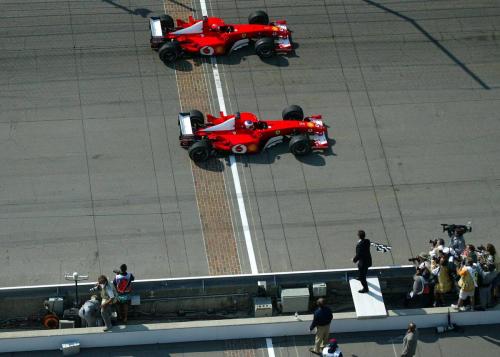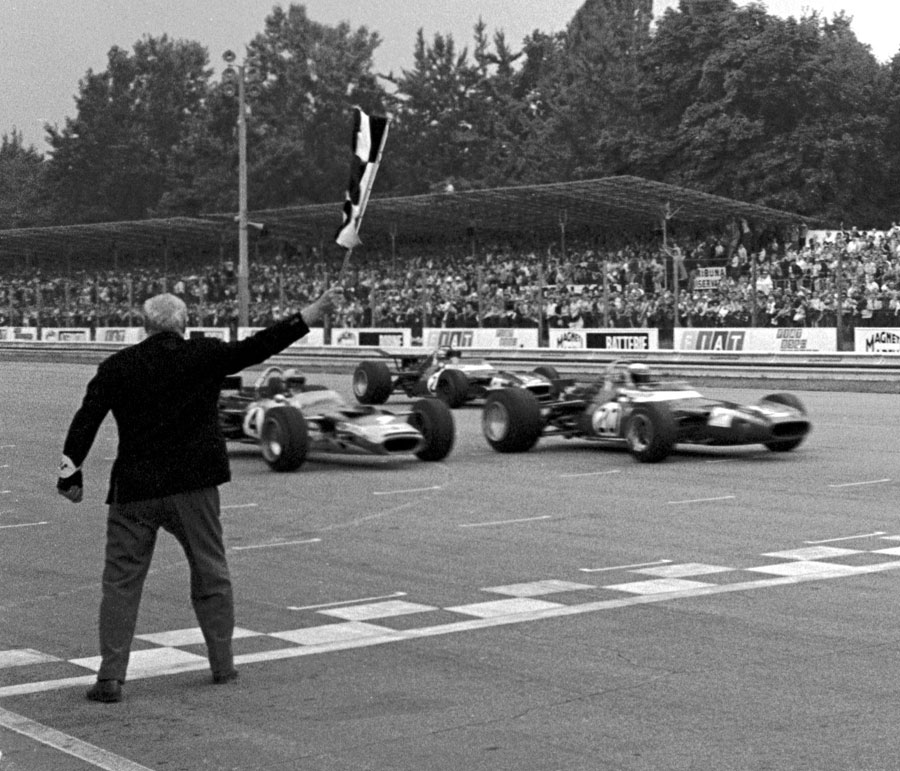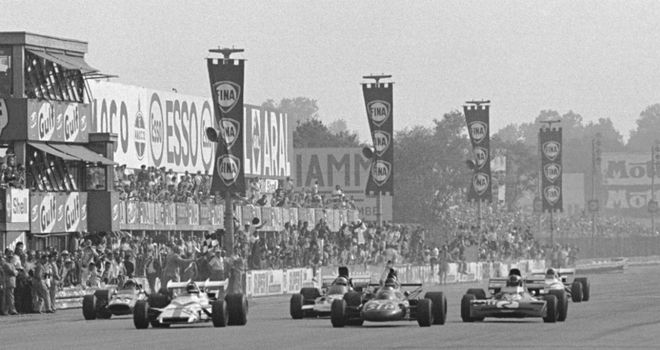

These days, F1 is becoming more about a single team’s domination. As a result, fans miss out on close duels or fights for the race victory. With multiple restrictions of fuel-saving , tire-saving, engine-saving, drivers are not motivated to push for those few extra points. Nevertheless, the sport’s history is so glorious, that it gives us another reason to fall in love with it. Here we present to you 5 of the closest F1 victories yet!
Closest F1 Victories
5. 1969 Italian Grand Prix
ADVERTISEMENT
Article continues below this ad

via Imago
Stewart in front, taking the chequered flag Courtesy: espnf1.com
The 1969 Italian Grand Prix had four finishers within 0.19 seconds of each other at the older, faster Monza layout. Jackie Stewart took the victory by a mere 0.08s from Jochen Rindt. As a result, he secured the driver’s championship and also the constructor’s championship for his team Matra.
Jochen Rindt was on pole with Jackie Stewart starting third. Stewart had a great start and quickly took first place from Rindt on the first lap itself. The top seven were closely packed with only 3.5s seconds separating them.
The lead constantly swapped amongst the first seven until lap 23, when Stewart got back in the first position. Stewart’s team mate, Jean-Pierre Beltoise took second from Graham Hill after Hill’s car gave up on lap 64. Jochen Rindt and Bruce McLaren were close behind as well.
With a few laps left, every corner of every lap was crucial. One mistake by any of the top four would mean losing their place. Beltoise lead into the Parabolica which meant Stewart and Rindt could use his slipstream. As a result of which, Stewart was able to put his car ahead by a mere 0.08s while only 0.19s covered the first four.
It was a splendid and iconic race finish, probably the closest 1-2-3-4. The classic slipstream battle around the Parabolica always made Monza an amazing race.
1982 Austrian Grand Prix

via Imago
Courtesy: f1fanatic.co.uk
The 1982 Austrian GP is still considered the most iconic Austrian Grand Prix. Elio de Angelis held off Keke Rosberg to take a stunning victory by a mere 0.05s, to clinch his maiden victory.
Angelis started on P7 and Rosberg just ahead of him in P6. Nelson Piquet was on pole.
Both Nelson Piquet and his team mate Riccardo Patrese retired from the race due to mechanical issues with their Brabham. de Angelis had the clear air to take the victory after Prost retired as well with a mere 10 laps to go, but the Finn, Rosberg was closing in on fast and was a clear contender for victory despite a 10s gap.
Angelis’ lead was down to 1.6s by the time the last lap began. Angelis seemed was making multiple mistakes under pressure and Rosberg was closing corner by corner.
The last lap was where Rosberg attacked from the inside, with Angelis taking a wide exit to the corner. Both the cars were side by side as they were crossing the chequered flag, but Elio de Angelis was able to secure his first victory by a mere 0.05s from Keke Rosberg. A brilliant finish, indeed. a gap of 0.05 seconds makes this one of the closest F1 victories ever.
3. 1986 Spanish Grand Prix

via Imago
Senna in his Lotus(left) ahead of Mansell in his Williams(right) taking the chequered flag Courtesy: f1fanatic.co.uk
The 1986 Spanish Grand Prix was the first race to be held at Jerez. It was a pure nail biting experience for the fans.
Senna qualified on pole, the two Williams’ car of Piquet and Mansell flanked him. Reigning world champion, Prost was starting in fourth.
The top four got away quickly at the start of the race. Mansell soon overtook his team mate Pique and started pushing towards Senna. Prost made up places through the course of the race to make himself the third contender for the race victory.
With 10 laps to go, Mansell took a pitstop to make up for his slow rear left puncture and came along with fresh rubber, almost 20s behind the leader, Senna. His first lap post the fresh rubber was 1.3s faster than his previous best. The next lap, he overtook Prost and reduced Senna’s lead to 5.3s for the last two laps. Before the end of the last lap, that lead was cut down to 1.5s.
Senna made his car very wide and held off the charging Briton. The margin of victory was a mere 0.014s. Mansell not only lost the race, but three crucial championship points which at the end of the season made a very big difference. This is one of the closest F1 victories of that era.
2. 2002 Indianapolis Grand Prix
The 2002 was the highlight of the Schumacher-Ferrari era. It was round 16 of the season and the driver’s and constructor’s championship were already sealed. A huge crowd came to acknowledge the champion Schumacher who easily topped all the practice and qualifying sessions. Ferrari secured the 1-2 position in Qualifying with Schumacher on pole. With not much challenge from the rest of the pack, the two Ferrari drivers led comfortably through the race in their 1-2 position.
At the last corner of the race, Schumacher slowed down, enough for Barichello to close up. The two Ferraris as a result finished within a millimetre of each other with Schumacher’s intention of attempting a dead beat(finishing at the same time), but Barichello edged past by a mere 0.011s. To the fans and spectators, it seemed like a tie and to the commentators, Schumacher was the winner. But computers and replays edged towards Barichello
It was one of the closest f1 victories since the introduction of the measurement up to a thousand of the second. Schumacher faced heavy criticism for going against the integrity of the sport and making a mere mockery of it.
1. 1971 Italian Grand Prix

via Imago
Peter Gethin(Second from left) after winning the iconic race. Courtesy: skysports
This was the fastest race ever in the sport, with an average speed of 242.615 km/h. This record stood until the 2003 Italian Grand Prix. But, it still holds the record for the closest Formula One victory yet. Peter Gethin in his BRM won from starting 11th. The margin of victory was a mere 0.01s from Ronnie Peterson’s March-Ford. The top five finishers were covered with 0.61s of each other while the next finisher, was a massive 32s behind.
Chris Amon was on pole in his Marta with the Ferrari of Jacky Ickx closely behind in second. The championship was already settled in favour of Jackie Stewart, which meant that there was nothing but a race victory at stake.
Start had Clay Regazoni storming from fourth to take the lead until succumbing to Ronnie Peterson in his March on lap 3. By lap 7, Jackie Stewart was in the lead until lap 16, when both he and Jacky Ickx retired with mechanical issues with the car.
During those times, Monza was a super fast circuit with extreme slip-stream overtaking possibilities. Hence the number of overtakes were usually immense. During this particular race, the lead changed between 8 different drivers and changed a massive 24 times within the 55 laps!
ADVERTISEMENT
Article continues below this ad
Peter Gethin was third when the pack of six cars dived into the Parabolica. Using the slipstream of Peterson and Hailwood ahead, coupled by some real fine adjustments to his car, Gethin was able to snatch the lead and able to hold it, to win his first and the only race of his career! It was one of the closest f1 victories, no strike that, it was the closest.
ADVERTISEMENT
Article continues below this ad
This was the last race at the chicane-less, super fast Monza layout, and indeed an iconic one, in every sense.
ADVERTISEMENT
ADVERTISEMENT
ADVERTISEMENT
ADVERTISEMENT


